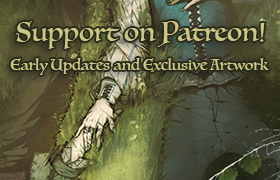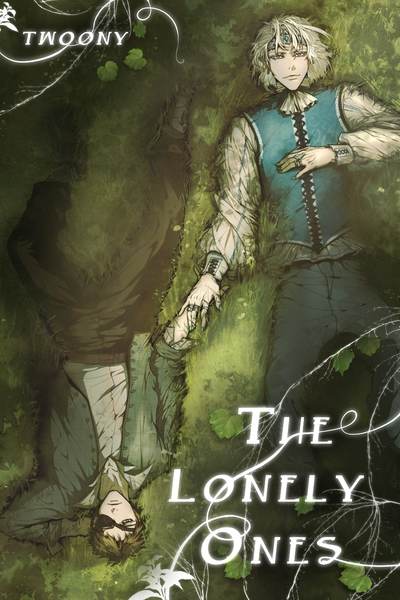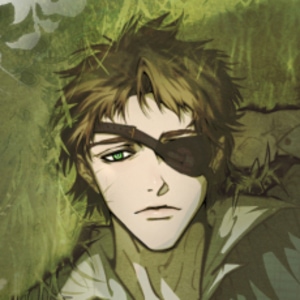Everyone knows not to stray from the Jolly Road, weaving through evergreen trees with branches that hang low, like crooked fingers beckoning somber souls close. Travelers whisper sweet nothings to their loved ones in the night since one may vanish come daybreak. They huddle close to their carriages, peering into the Grim Woods that smell as pleasant as honey or as intoxicating as wine. Those that traveled the road speak of hearing loved ones long passed whispering in the breeze. Others see their silhouette in the heavy shadows, hands outstretched in a silent plea. But do not listen. Do not go. They are hungry.
When a poor soul wanders too far from the red stones of the Jolly Road, they rarely ever return. And if they do, the experience forever changes them, speaking of the fair ones with their flawless skin and glittering eyes. Food tastes of ash and no drink can quench their never ending thirst. Some stumble on bloody nubs where their feet once were, giggling about dancing among rivers of twilight. Breathing they may be, but breath does not mean alive.
Then why travel such a perilous road? Why risk the wrath of the woods?
Well, the tale begins with the High King of Grim, who presided over the Grim Woods long before man ever came to be. His domain stretched west to east, for hundreds and hundreds of miles. Long ago, a king of Valsinya wished to expand the kingdom north, past the Grim Woods, so he made a deal with the High King. Make a path for mortals to take through the woods. In exchange, whatever poor soul falls to the tricks of the forest is fair game. There will be no repercussions from the kingdom. Why, oh why, would the fair ones pass up such despicable fun?
Now the rich pay for ships to sail north when needed while the poor risk traveling along the Jolly Road for work, food, health, and survival.
There are only stories of what truly lies in the Grim Woods, from those that crawled out of the forest half dead and mad, or the fae that live among mortals. But the fair ones never say much when asked. They cannot lie, so they weave suggestions and dishonest truths into stories that may tell much or absolutely nothing at all.
“Maybe there’s a castle made of starlight resting deep within a lake. Maybe there are dragons sleeping under hills, breathing warmth that keeps the woods forever green. Maybe there’s a king on his throne of thorns and a queen made of rose petals snickering with twisted, pointy teeth,” Ima says to the boy sitting at her table. Green eyes fresh as spring blossoms, breathing in days devoid of winter’s chill, watch her stir the pot once, twice, and never more, for his curiosity is a relentless hunger.
“Why maybe?” he gripes, bottom lip jutted out. “Why not definitely? What’s in there, Ima? You’re a fair one, tell me, tell me!”
“You’re lucky this fair one takes no joy in the folly of mortals, otherwise, you would long be cursed. Perhaps a pig nose for your gluttony and the ears of a cat for your curiosity, then I would make you tiny as a mouse, weak as you are.”
“I am not weak. I’m little!”
“All mortals are weak. Your lives are so short that you miss the answers right in front of you because you’re too busy struggling to make your limited time worthwhile.”
The boy sprawls out on the table, wild locks of woodsy brown flutter before his squinted eyes. “You speak oddly,” he asserts. “Sometimes I don’t understand.”
“Mortals rarely do.”
“There you go again. If you hate us so much, why live here?”
Ima smiles a devious smile, one that adds to the boy’s curiosity. What is that smile saying? What is she hiding? Ima never explains, never tells.
“Head home, Artemis. It is getting dark, and the woods are most hungry when the full moon rises,” she says, immediately regretting it.
“Why is it more hungry? Is it because the moon looks like a wheel of cheese?”
“Go,” she orders, taking two coppers from a jar in the cupboard, then tossing them to Artemis. He catches both with a toothy grin.
The coppers are payment for his weekly work of sprucing up the garden. Ima could do it herself, had done so many years before him. But Artemis is the only person in town that doesn’t bother her.
There were only three kinds of visitors before Artemis; those that wanted her dead, those that wanted what she could give, and those who longed to lie with her. The beauty of Ima, and those like her, are known far and wide. Long golden curls like wisps of morning sunlight encircle her slim silhouette. Those that look upon her know she is fae for the perfect symmetry of her face is almost unnerving. And her eyes shine redder than sweet cherries, or freshly spilled blood. Having one visit that is only curious, that only sees her as an odd witch on the edge of town—well, it’s almost a comforting thought.
Artemis pouts, but never argues. He hops down from the chair, pushing it in after. Pleasant manners for such a young thing. Fae are fond of respect and manners, although they are well known for stabbing each other in the back. But one cannot complain or curse of manners when they’re dead.
“I appreciate the coin,” he says, remembering what Ima taught him. Never thank fae or apologize. That implies you owe them something, and that something is always more than you can imagine. Then again, Artemis breaks many rules with Ima.
“I’ll return soon to work, or ask more questions,” he chuckles, then bursts out the front door and down the porch steps.
Ima watches from the doorway. His silhouette shrinks, moving through the path within the high golden wheat fields to the village of Eidenswill beyond. She studies the Grim Woods a few feet away; the shadows swaying like ocean waves, threatening to drown any that dare grow near.
She smiles.
If she were to tell Artemis what waits within the woods, he may never sleep again.












Comments (15)
See all